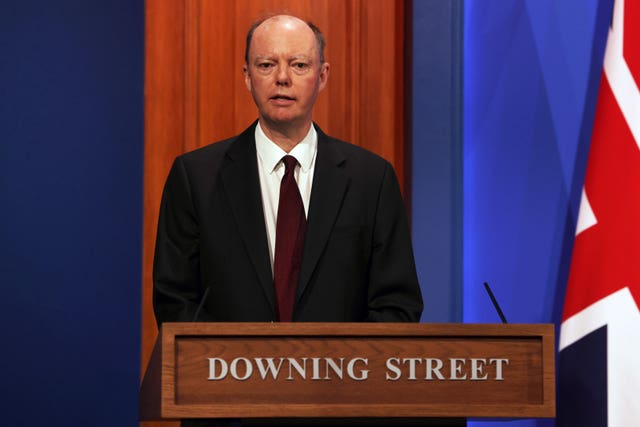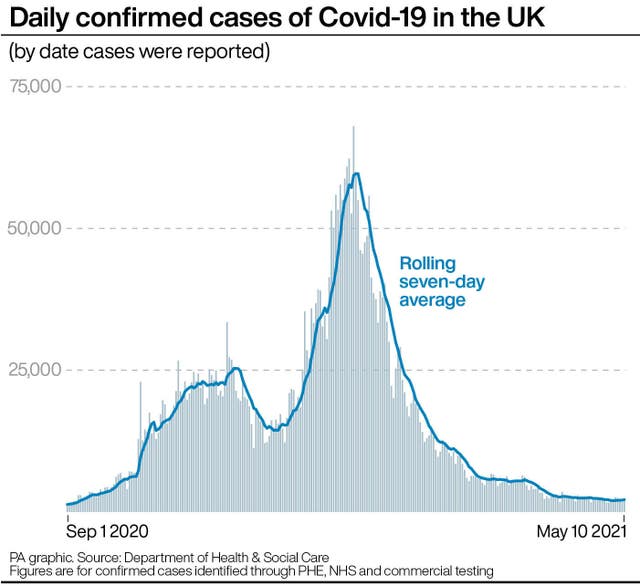
New variants of the virus which causes Covid-19 can “come out of a blue sky”, England’s chief medical officer has said, after figures show a “sharp” rise in infections in the UK with the variant of the virus first found in India.
Cases of the variant have doubled in a week, with 520 cases now identified in the UK.
And the variant may be even more transmissible than the one which was first identified in Kent, Professor Chris Whitty said.
New data presented at the Downing Street Covid-19 press conference shows that 520 cases of the variant have been identified in the UK up to May 5 – 318 more than the week before.

Prof Whitty said officials need to keep a “close eye” on cases of the “slightly concerning” variant in the UK.
But he said that fewer than 5% of cases at the moment are variants which are not the Kent variant, which is the most dominant in the UK.
He told the Downing Street press conference: “Most of the (variants) are currently relatively stable and not increasing at a great rate, the one that is slightly concerning in terms of increasing as a proportion is the variant which has been described from India.
“In certain parts of the UK, and that does appear to be increasing – but from very low levels – over the last two weeks.”
Prof Whitty added: “This is actually spreading from very small amounts but it is beginning to spread in certain parts of the country and we need to keep quite a close eye on this.”
He said that there are three variants which have been identified in India, but the one officials are “worried” about in the UK is called B.1.617.2.
“It has gone up very sharply and that is a reason for us to be very careful about it and there is a lot of work being done at Public Health England to try and delineate where it is and to work out ways we can get on top of the curve of that by testing and isolation,” Prof Whitty said.
“What we know with all the variants is that things can come out of a blue sky – you’re not expecting it and then something happens – that happened with the B.1.1.7 (the variant first identified in Kent), that has happened to India with this variant as well.
“At this point in time, our view is that this is a highly transmissible variant, at least as transmissible as the B.1.1.7 variant – it is possible it is more transmissible but we’ll have to see.”
But he added that the current thinking was that it is “less likely” to evade the protection people have from vaccination compared with some other variants in circulation.

“Of course we don’t know if this is going to cause significant problems in the autumn,” Prof Whitty added.
“The way to deal with that is to identify the cases, isolate where we can, get through the rest of the vaccination programme, ensure that we have the capacity to pick these up and to re-vaccinate as necessary when the autumn comes.”
Prof Whitty said the way to prevent or minimise the number of new variants is to “get on top of” the pandemic globally.
It comes as the World Health Organisation said there was a “shocking disparity” in access to Covid-19 vaccines between rich and poor countries.
The full remarks by @DrTedros at the #COVID19 media briefing – 10 May 2021 ⬇️ https://t.co/46wH25BzFL
— World Health Organization (WHO) (@WHO) May 10, 2021
WHO director general Dr Tedros Adhanom Ghebreyesus told a press briefing: “The shocking global disparity in access to Covid-19 vaccines remains one of the biggest risks to ending the pandemic.
“High and upper-middle income countries represent 53% of the world’s population, but have received 83% of the world’s vaccines.
“By contrast, low and lower-middle income countries account for 47% of the world’s population, but have received just 17% of the world’s vaccines.”
He added: “How quickly we end the Covid-19 pandemic and how many sisters and brothers we lose along on the way, depends on how quickly and how fairly we vaccinate a significant proportion of the population and how consistently we all follow proven public health measures.”


Comments: Our rules
We want our comments to be a lively and valuable part of our community - a place where readers can debate and engage with the most important local issues. The ability to comment on our stories is a privilege, not a right, however, and that privilege may be withdrawn if it is abused or misused.
Please report any comments that break our rules.
Read the rules here